上海牛津版英语初三九年级上册九上9AUnit3U3同步讲义教案
牛津译林版九年级上册英语(新)教案9AUnit3Studyskills
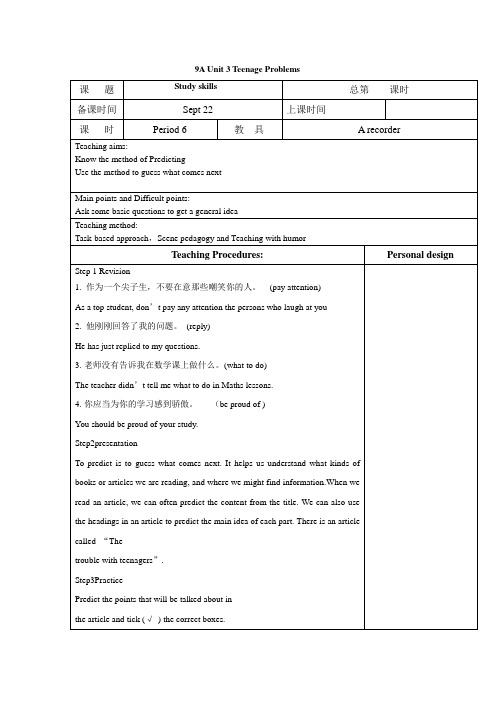
Step2presentation
To predict is to guess what comes next. It helps us understand what kinds of books or articles we are reading, and where we might find information.When we read an article, we can often predict the content from the title. We can also use the headings in an article to predict the main idea of each part. There is an article called“The
9AUnit3Teenage Problems
课题
Study skills
总第课时
备课时间
Sept 22
上课时间
课时
Period6
教具
A recorder
Teaching aims:
Know the method of Predicting
Use the method to guess what comes next
Main points and Difficult points:
Ask some basic questions to get a general idea
Teaching method:
Task-based approach,Scene pedagogy and Teaching with humor
trouble with teenagers”.
九年级英语上册Unit3教案新版牛津版

1. You eat too much.
too much太多,修饰不可数名词
too many太多,修饰可数名词
much too太……,修饰形容词
2. getenoughsleepenough+ noun. adj.+ enough
3. get low marks in exams get high marks
8. Sometimes I feel lonely.
feel + adj.系表结构
lonely adj.孤独的,寂寞的
alone adj.独自,单独
Step 5 Prcacice
Step 6 Homework
(1)《课课练》
(2)《自主学习与探究》
Blackboard design:
Unit 3 Teenage problems
2.Fill in the blanks
Eddie seems a little worried. He tells Hobo that he has a _______. What is it? Eddie asks Hobo to look at his _______ and says he is ______ _______. Hobo thinks that he eats too ______. So Hobo advises him to eat _______ and do more _______. Eddie ______ with Hobo. Then Hobo takes up Eddie’s bowl and says,“Let me ______ the food ______ you.”With these words, Hobo begins to enjoy the food while Eddie feels so angry.
九年级英语《9A unit3 welcome to the unit》教案 牛津版
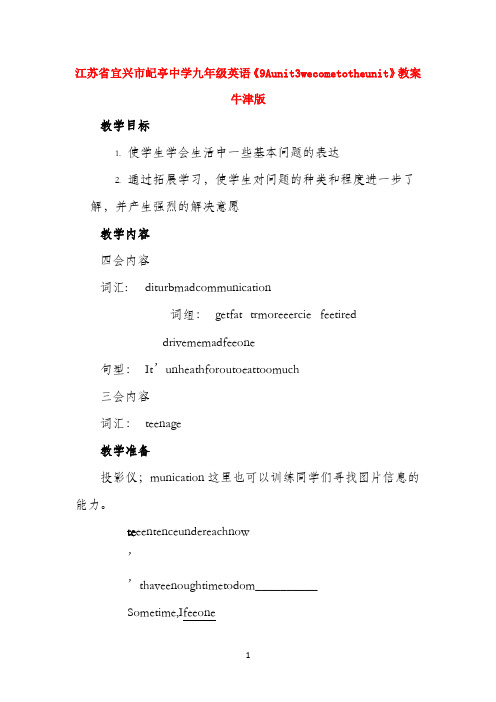
江苏省宜兴市屺亭中学九年级英语《9Aunit3wecometotheunit》教案
牛津版
教学目标
1.使学生学会生活中一些基本问题的表达
2.通过拓展学习,使学生对问题的种类和程度进一步了
解,并产生强烈的解决意愿
教学内容
四会内容
词汇: diturbmadcommunication
词组:getfat trmoreeercie feetired
drivememadfeeone
句型:It’unheath foroutoeattoomuch
三会内容
词汇:teenage
教学准备
投影仪;munication这里也可以训练同学们寻找图片信息的能力。
te eentenceundereachnow
’
’thaveenoughtimetodom__________
S ometime,Ifeeone
5Mcouinawamaeaotofnoieand_________mewhenI’mtudi ng
t imeforme
同学们自主完成填空,并以问答的方式想班级展示答案。
老师同时在多媒体上给出答案。
Ste ur
Ste
这一步将对话处理成听力,因为它比较简单。
Ste6练习
1老师播放录音,学生跟读并进行分角色朗读。
2老师说:通过这一步来强调一部分知识点。
3学生表演对话,并加入自己的语言。
家庭作业。
九年级英语上册《9A Unit 3 Teeenage problem》教学案
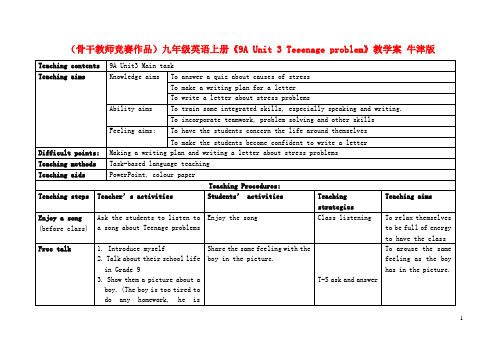
Teaching steps
Teacher’s activities
Students’activities
Teaching strategies
Teaching aims
Enjoy a song
(before class)
Ask the students to listen to a song about Teenage problems
3. Show them a picture about a boy. (The boy is too tired to do any homework, he issleeping and having an interesting dream about homework.)
Share the same feeling with the boy in the picture.
Difficult points:
Making a writing plan and writinga letter about stress problems
Teaching methods
Task-based language teaching
Teaching aids
PowerPoint,colourpaper
(骨干教师竞赛作品)九年级英语上册《9A Unit 3 Teeenage problem》教学案 牛津版
Teaching contents
9AUnit3 Main task
Teaching aims
Knowledge aims
To answer a quiz about causes of stress
上海版牛津英语九年级第一学期9A Unit 3 教案设计 (共13课时)
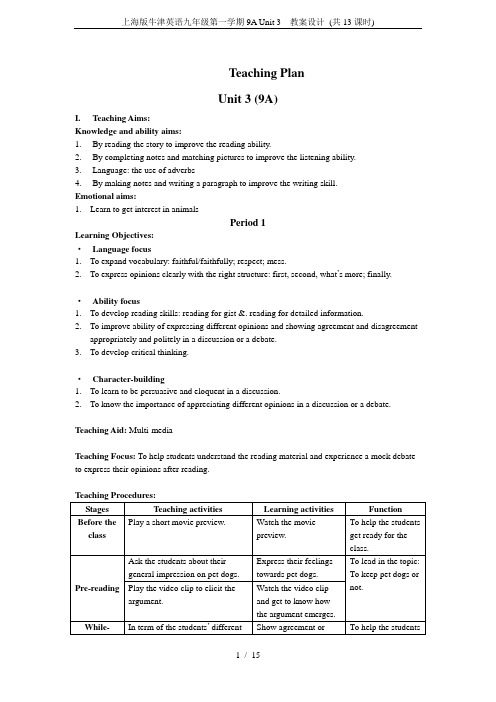
Teaching PlanUnit 3 (9A)I.Teaching Aims:Knowledge and ability aims:1.By reading the story to improve the reading ability.2.By completing notes and matching pictures to improve the listening ability.nguage: the use of adverbs4.By making notes and writing a paragraph to improve the writing skill.Emotional aims:1. Learn to get interest in animalsPeriod 1Learning Objectives:·Language focus1.To expand vocabulary: faithful/faithfully; respect; mess.2.To express opinions clearly with the right structure: first, second, what’s more; finally.·Ability focus1.To develop reading skills: reading for gist &. reading for detailed information.2.To improve ability of expressing different opinions and showing agreement and disagreementappropriately and politely in a discussion or a debate.3.To develop critical thinking.·Character-building1.To learn to be persuasive and eloquent in a discussion.2.To know the importance of appreciating different opinions in a discussion or a debate. Teaching Aid: Multi-mediaTeaching Focus: To help students understand the reading material and experience a mock debate to express their opinions after reading.教后感:利用课件进行教学效果不错,使我们的教学生动与有趣,不再让学生感觉英语是很抽象的知识,训练比较到位。
九年级英语 9A unit 3教案 牛津版
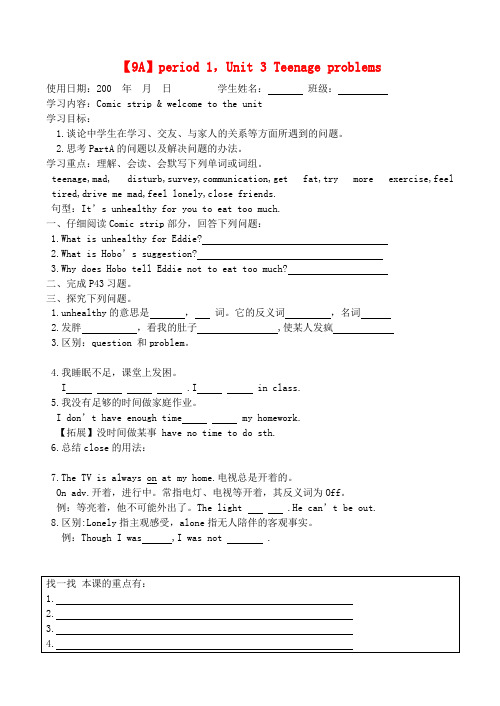
【9A】period 1,Unit 3 Teenage problems使用日期:200 年月日学生姓名:班级:学习内容:Comic strip & welcome to the unit学习目标:1.谈论中学生在学习、交友、与家人的关系等方面所遇到的问题。
2.思考PartA的问题以及解决问题的办法。
学习重点:理解、会读、会默写下列单词或词组。
teenage,mad, disturb,survey,communication,get fat,try more exercise,feel tired,drive me mad,feel lonely,close friends.句型:It’s unhealthy for you to eat too much.一、仔细阅读Comic strip部分,回答下列问题:1.What is unhealthy for Eddie?2.What is Hobo’s suggestion?3.Why does Hobo tell Eddie not to eat too much?二、完成P43习题。
三、探究下列问题。
1.unhealthy的意思是,词。
它的反义词,名词2.发胖,看我的肚子 ,使某人发疯3.区别:question 和problem。
4.我睡眠不足,课堂上发困。
I .I in class.5.我没有足够的时间做家庭作业。
I don’t have enough time my homework.【拓展】没时间做某事 have no time to do sth.6.总结close的用法:7.The TV is always on at my home.电视总是开着的。
On adv.开着,进行中。
常指电灯、电视等开着,其反义词为Off。
例:等亮着,他不可能外出了。
The light .He can’t be out.8.区别:Lonely指主观感受,alone指无人陪伴的客观事实。
九年级英语上册 Unit3(6-10)教案 牛津版
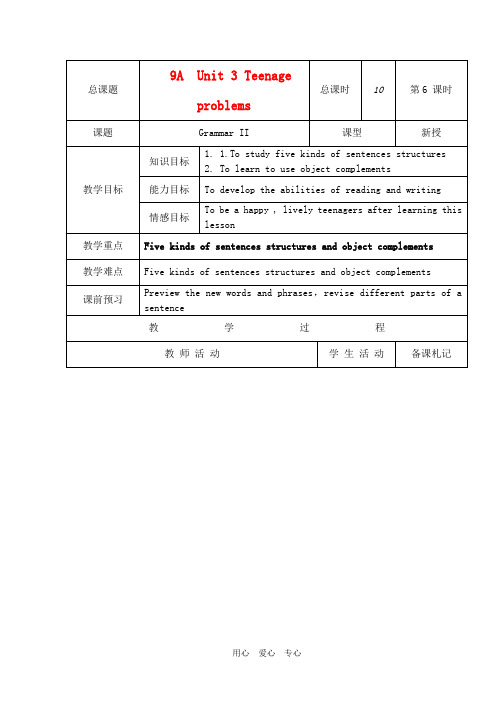
To be a happy , lively teenagers after learning this lesson
教学重点
教学难点
Five kinds of sentences structuresand object complements
课前预习
Preview the new words and phrases,revise different parts of a sentence
教 学 过 程
教 师 活 动
学 生 活 动
备课札记
I.Have a revision
II. Ask Ss to look at the table at the top of Page 47. Tell Ss that an object complement is an adjective (or adjective phrase)oranoun (or noun phrase) that relates to the object. Encourage Ss to ask questions about object complement.
情感目标
Be a happy , lively teenagers after learning this lesson
教学重点
教学难点
Tolisten andwrite notes about a student profile
课前预习
To get as much information aboutTeenage problemsas possible
Translate some sentences and do some erercises
九年级英语9A Unit3全套精品教案 牛津版

9AUnit3 teenage problemsPeriod One(Wele to the unit/ vocabulary )●objectives1.to talk about problems and their causes2.to think about personal problems and how to deal with them.3.To understand the different meanings of the verb “to be”4.To use the verb “to get” when talking about problems●Language function and focusI’ve got a problem.=I have a problem.Eating too much makes you unhealthy. Get too many tests and examsQuarrel with sb. Family membersGet a bus=take a bus get angry=bee angryI don’t have much time to revise for tests.●Teaching methodsListening/ writing/ speaking/discussing●Teaching proceduresPart A1.Explain that most teenagers have problems. Tell students that if they ever need to talk abouttheir problems, they should talk to their teachers, friends or family. Tell students that having a problem is nothing to be ashamed if ----everyone has worries from time to time.2.Ask students work in groups. Discuss their problems and write on the paper. The teacher callsome groups to speak out the problems and help them how to solve them.3.Show the students pictures about problems. Ask individuals to speak out which problem it is.If one has spoken out, he or she can ask his or her best friend to speak out next problem.4.Ask students to work in pairs to plete Part A on Page 39. Once all students have finished, askone student at a time to read out what they have written. Listen for mistakes and mispronunciation.Part B1.tell students you want to do a survey of the problems that students in the class have. Write thefollowing headings on the board:Not enough sleepNot enough time to do homeworkToo noisy to studyLonelyArgue with cousin/classmate/parentParents are always busyRead out each problem in turn, and ask students to raise their hands if they have this problem. Make a tally of the problems that students have. This will reinforce a group feeling. Finally, make a note of the biggest problem the class has. Write the following on the board:“The biggest problem Class …Grade ... has is …”2.Explain that part B is different from the previous exercise, as students have to rank how bigthese problems are in their lives.Explain to students that number 5 means that this is a big problem for them while number 1 means it is a small problem.3.Tell students to plete Part B on their own. You may want to give the exercise as homework, asstudents may feel fortable writing about their problems in private. You could ask volunteers to give their answers but do not force students. If there are no volunteers, do not go over the answers to this exercise with the class. Keep the students’ answers confidential.4.For stronger classes, ask students to add what they consider to be the biggest problemsteenagers face to the list if these are different to those on the list.V ocabularyPart A1.Explain that the words in the box at the top of Page 44 are synonyms of the verb “to get”below the pictures, and can be used to replace “get” in each picture.2.Ask students to work in pairs to plete Part A.3.For weaker classes, ask students to read out the answer for each picture. For stronger classes,after students have read out the answers, ask them to make sentences using the phrases under the pictures.Part B1.Explain to students that they can use their answers from Part A to help then with the exercisein Part B. for weaker classes, students can work in pairs to plete Part B. For stronger classes, students can work on their own.2.For stronger classes, once students have finished, ask two students to read out the whole letter.pliment them on parts of the letter they read particularly well.3.For weaker classes, ask students if they have the same problems as Amy. Ask students to raisetheir hands if they do. For stronger classes, ask students what their advice would be for Amy. ic strip1.Play the tape for the students to find out the problem. If they can’t get the answer, the teachercan play the second time.2.Explain some language points for the whole class. Then ask them to try to perform this shortplay.Homework:1.If you have any ___________ (问题),you can ask your teacher for help.2.Eating too much is bad for our ____________. It makes us __________ (健康)3.____________ (游泳) is one of my favourite sports.4.John got up too late to have breakfast, so he felt ___________ at school.5.The meeting has bee ___________ (结束) for two hours.6.Thank you for ___________ (邀请) me to your party.7.You must look after y_________ and keep healthy, Mum and Dad.8.We have our first class at a _____________ (一分钟)to eight.Design on BbStudent s’ problemstoo noisy after classDon’don’后记:通过这堂课使我了解到学生中的各个问题和他们的想法。
九年级英语上册Unit3(1-5)教案牛津版
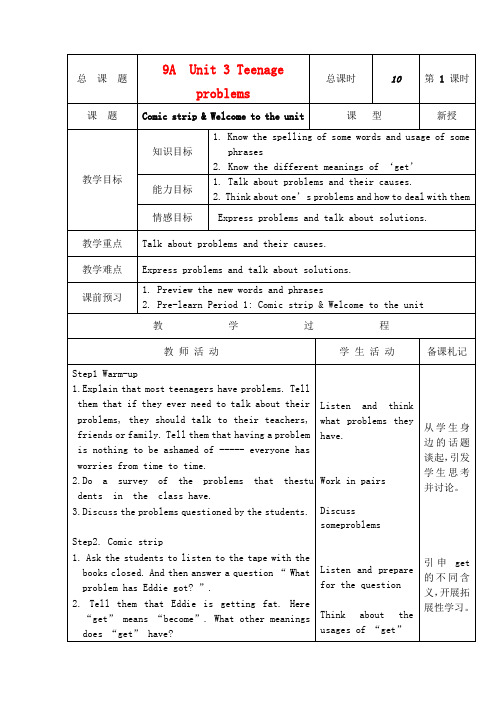
“noisy ” and
“quar rel” 的 用法区 别.
青少年学 生常见的 问题
教
学
过
程Hale Waihona Puke 教师活动学 生 活 动 备课札记
4.Explain to students that number 5 means that this is a big problem for them while number 1 means it is a small problem.
能力目标 To ask for advice
情感目标
To recognize and understand vocabulary about problems.
To understand how to write about problems and to express feelings
To ask for advice To recognize and understand vocabulary about problems. 1. Preview the new words and phrases of this period 2. Pre-learn Period 2: Reading (A)
引 申 get 的不同含 义,开展拓 展性学习。
教
学
教师活动
过
程
学 生 活 动 备课札记
选用所给词组的适当形式填空: get a good mark, get some help from, get enough sleep, get excited, get a bus, get married 1). My uncle ______________ last year. 2). Did you hear Simon __________________ in the exam? 3). You didn’t ______________,did you? 4). The audience _____________ when they saw Hello Kitty. 5). My father _____________ to work every day. 6). Shall we ________________ from an adviser?
Unit3 教案牛津译林版九年级英语上册
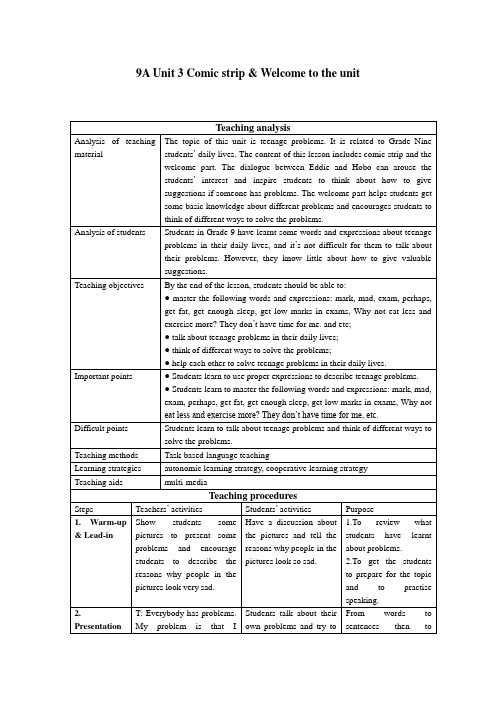
By the end of the lesson, students should be able to:
●master the followingworaps, get fat, get enough sleep, get low marks in exams, Why not eat less and exercise more? They don’t have time for me. and etc;
3.To practise the students’ pronunciation and intonation.
4.Tohelp students master theimportant points in this dialogue.
5.To cultivate the students’ imagination and arouse the students’ enthusiasm in class.
Difficult points
Students learn to talk about teenage problems andthink of different ways to solve the problems.
Teaching methods
Task-based language teaching
2. Encourage the students toask some questions about these sentences.
3.T: Who do you prefer to talk about your problems with?
S1:...S2:...S3:...
Millie is talking with her mum about teenage problems. Listen to their dialogue then answer the questions:
九年级英语上册9AUnit3《TeenageProblems》Reading教学设计牛津版

九年级英语上册9AUnit3《TeenageProblems》Reading教学设计牛津版9A Unit3《Teenage Problems》Reading教学目标:1、学习如何写出自己的烦恼及如何表达情感2、学习如何向别人寻求建议。
教学重点、难点:deal with stay up late hand in hear from plenty of on time be of great value crazy aboutstay out late allow sb. to do it from time to timeachieve a balanceI have no choice but to do it.I hardly have any space time for my hobbies such as playing volleyball and ping-pong.I often doubt whether it is worth working so hard.Can you offer me some suggestions?My dream is to be a great football player.I believe it is important for us to spend some time on our hobbies/Can you please advise me how to achieve a balance between my schoolwork and my hobbies?教学准备:A computer A radio教学步骤:Step 3 Activities;1、完成以下表格,谈论Million 和 Simon的苦恼。
Step 4 Presentation:1、解释课文中的重点及难点⑴be crazy about⑵My dream is to be\do sth⑶plenty of⑷stay out late( to do sth)⑸get into trouble⑹allow sb to do sth⑺be strict with sb\about sth⑻have one’s support⑼advise sb to do sth⑽achieve a balance between and2、完成46页B部分练习3、连接下列同义词或反义词go home adviceearlier latersuggest rememberforget about stay out4、完成47页D部分练习Step 5 家庭作业1、记忆相关词汇、词组及句型。
2020牛津译林版英语九年级上9A Unit3精品教学案(共10课时)
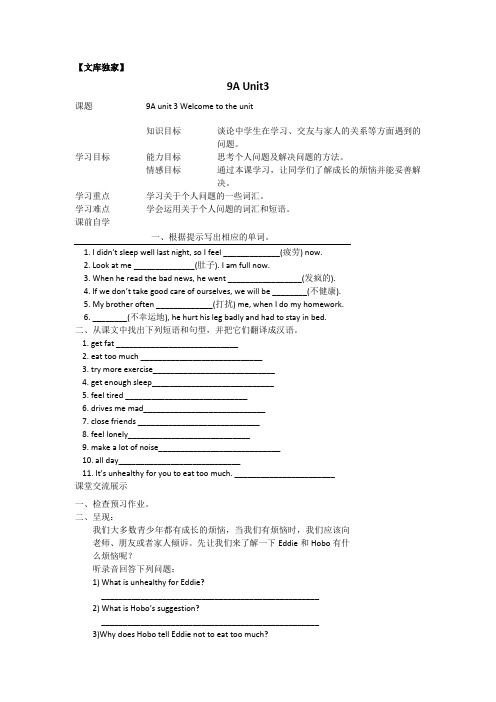
【文库独家】9A Unit3 课题9A unit 3 Welcome to the unit学习目标知识目标谈论中学生在学习、交友与家人的关系等方面遇到的问题。
能力目标思考个人问题及解决问题的方法。
情感目标通过本课学习,让同学们了解成长的烦恼并能妥善解决。
学习重点学习关于个人问题的一些词汇。
学习难点学会运用关于个人问题的词汇和短语。
课前自学一、根据提示写出相应的单词。
1. I didn’t sleep well last night, so I feel _____________(疲劳) now.2. Look at me ______________(肚子). I am full now.3. When he read the bad news, he went _________________(发疯的).4. If we don’t take good care of ourselves, we will be ________(不健康).5. My brother often _____________(打扰) me, when I do my homework.6. ________(不幸运地), he hurt his leg badly and had to stay in bed.二、从课文中找出下列短语和句型,并把它们翻译成汉语。
1. get fat ____________________________2. eat too much ____________________________3. try more exercise____________________________4. get enough sleep____________________________5. feel tired ____________________________6. drives me mad____________________________7. close friends ____________________________8. feel lonely____________________________9. make a lot of noise____________________________10. all day____________________________11. It’s unhealthy for you to eat too much. _______________________课堂交流展示一、检查预习作业。
- 1、下载文档前请自行甄别文档内容的完整性,平台不提供额外的编辑、内容补充、找答案等附加服务。
- 2、"仅部分预览"的文档,不可在线预览部分如存在完整性等问题,可反馈申请退款(可完整预览的文档不适用该条件!)。
- 3、如文档侵犯您的权益,请联系客服反馈,我们会尽快为您处理(人工客服工作时间:9:00-18:30)。
学员编号:年级:初三课时数:3 学员姓名:辅导科目:英语学科教师:授课类型T Unit3(牛津9上)基础知识梳理教学目标1、使学生能够基本掌握牛津9年级上册Unit3中的基础词汇及重要句型;星级★★★★授课日期及时段(建议2-5分钟)T同步基础知识梳理你家里有宠物吗?你对于养宠物的行为怎么看?批注:上面六幅图片都是宠物的图片,有宠物猫、狗、兔子和金鱼,主要目的是通过视觉效应把学生带入本次课堂,因为本单元的主题是pets,老师需要引导学生进行宠物的列举和讨论,正好切合照应本单元的阅读部分观点对对碰的中心和主题。
(建议20-25分钟)想要描述你家的宠物宝宝吗?让我们先把单词各个击破吧!一、词汇Words1. opinion n. 意见,想法,看法e. g. Your opinion is very useful. 你的观点很有用。
【知识拓展】in my opinion = I think 以我的观点,我认为e.g. In my opinion, Lu Xun is one of the greatest writers in China. 我认为,鲁迅是中国最伟大的作家之一。
批注:这里可以引导学生在作文中使用in my opinion的表达,依据学生水平的不同,针对中等偏上的学生可以适当拓展in my opinion= as far as I am concerned 的表达。
2. responsibility n. 责任,负责e. g. It is police’s responsibility to keep the city safe. 警察的责任是保卫城市安全。
【知识拓展】responsible adj. 负责的,有责任的be responsible for =be in charge of = take charge of 对…负责e.g. My grandpa is responsible for a big company. 我的爷爷负责一个大公司。
批注:本单词属于中考中的高频单词,在带领学生学习的时候,先让学生根据名词responsibility联想到形容词responsible,然后再拓展到相关的词组搭配,同时把考纲词组中的近义同义词组全部列举。
3.death n. 死亡e. g. Whitney Houston’s death made all her fans upset. 惠特尼休斯顿的死讯让所有的粉丝都很难过。
【知识拓展】die v. 死亡dead adj. 死了的,去世了的dying adj.濒死的,奄奄一息的die of 死于(疾病、过度悲伤等)e.g. She died of liver cancer at the age of 70. 她于70岁时死于肝癌。
die from 死于(某种原因,不包括疾病,过度悲伤)In cold winter, wild animals can die from lack of food. 在寒冷的冬天,野兽可能因为缺乏食物而饿死。
批注:die及其相关词形转换也属于高频词汇。
对学生的要求是必须能够熟练进行相关词性转换和用法,在这里要跟学生强调下died 和dead 的用法区别,如:The old man died five years ago. 这位老师死于五年前。
The old man has been dead for five years. 这位老人去世五年了。
4. respect n.&v. 尊重,慎重对待We should respect the old and care for the young. 我们应该尊老爱幼。
【知识拓展】respectable adj. 体面的,值得尊敬的批注:后缀-able常位于动词之后构成形容词,如forgettable 难忘的,comfortable舒服的,changeable 多变的等等。
5. faithfully adv. 忠实地,忠诚地e. g. He always performs his duties faithfully. 他一贯忠实地履行自己的职责。
【知识拓展】faith n. 信仰,信任e.g. Faith that justice would prevail impelled us forward. 正义必胜的信念激励着我们前进。
faithful adj. 忠实的,守信的e.g. We are all faithful listeners to the program. 我们都是这档节目的忠实听众。
批注:联想记忆法:help-helpful-helpfully; use-useful-usefully, 以便学生根据构词法记忆单词的相关变形。
6. mess n.肮脏,杂乱;不整洁(猫狗等的)粪便e. g. The room was in a mess. 这个房间杂乱不堪。
7. result n. 后果,结果e. g. Success depends on the results of this experiment. 成功与否取决于这次试验的结果。
【知识拓展】as a result结果e.g. Lily didn’t wear enough clothes, as a result, she got a cold. 丽丽没有穿足够多的衣服,结果,她感冒了。
8. bite v. 咬bite-bit-bittene.g. Barking dogs seldom bite. 爱叫的狗不咬人。
9.extremely adv. 及其,非常e.g. I found it extremely hard to work out the maths problem. 我发现做出这道数学题非常难。
10. unhappy adj. 不快乐的,不幸福的;悲伤的e.g. Although he has a great deal of money, he is unhappy. 尽管他有很多钱,但他并不开心。
【知识拓展】 好玩的词缀!否定前缀 un-加在名词、形容词或副词前unfinished , undoubted , unhappy ,unusual ,unimportant 等In-加在形容词,名词前incorrect , inability , inaccurate ,incomplete 等im-加在字母m,b,p 前impossible, impolite ,impolite 等我们在第一单元已经学习过词缀记忆法,还记得有哪些单词吗?批注:复习词缀记忆法1. –al ,名词变形容词的后缀,“不变词义,变词性”,例子:nature-natural ; nation-national ;classic-classical 。
2. dis-,可加在形容词、名词、动词前面,“不变词性,变词义”,构成否定含义,例子:agree-disagree ,like-dislike ,honest-dishonest 。
让学生自己回忆一下学过的含有这些词缀的词汇。
二、重要日常表达Important Daily Expressions1. from side to side 从左到右e.g. The small boat rolled from side to side. 小船左右摇晃。
【知识拓展】side by side 肩并肩地;一起2. grow up 成长;长大e. g. When I grow up, I would like to be a scientist. 当我长大的时候,我想成为一名科学家。
3. care for 关爱e. g. Young people should learn to care for others. 年轻人应该学会关爱他人。
【知识拓展】take care of= look after 照顾批注:可以让学生先思考同义近义词组,巩固和复习考纲词组。
4.as a result 因此;结果e. g. He didn ’t get up on time, as a result, he missed the bus. 他没有按时起床,因此他错过了公交车。
【知识拓展】回顾:还有哪些词缀呢?后缀-al 表示: “…..的” 前缀:dis- 表示:“不”,表否定含义result from起因于e. g. His illness resulted from bad food. 他的病是由于吃了变质的食物所致。
result in结果;导致是e. g. Their dispute resulted in war. 他们的争端导致了战争。
5.stop… from 阻止某事发生e. g. The guard stopped him from going through the gate. 警卫不让他通过大门。
【知识拓展】stop/prevent/keep…from…阻止/预防某事发生【指点迷津】stop to do sth. 与stop doing sth.stop to do sth. 停止、中断(某件事),目的是去做另一件事e. g. They stopped to work and have a rest. 他们停下来工作并休息了一会儿。
stop doing sth. 停下正在做的事Please stop speaking. It’s time to begin our class. 请肃静,上课时间到了。
批注:回顾复习法。
关于stop的用法对于学生来说应该是基本的,所以可以要求学生先自己回顾stop 的相关所有考点和用法,然后再对学生没有掌握的地方进行点拨即可。
讲到stop to do/doing的时候,可以让学生顺便复习相关还有相关用法的remember及forget的知识点。
6.pay for为……付钱e. g. I have to pay 150 dollars for the sewing machine. 我得花150美元买这台缝纫机。
【指点迷津】spend, take, pay, cost,buy/purchase四者都可表示“花费”(1) spend的主语通常是人,往往用于以下句型:(sb)spend some money/some time on sth.(sb)spend some money/some time(in)doing sth.e. g. I spent fifty yuan on the coat.=I spent fifty yuan (in) buying the coat.我花50元买了这件大衣。
